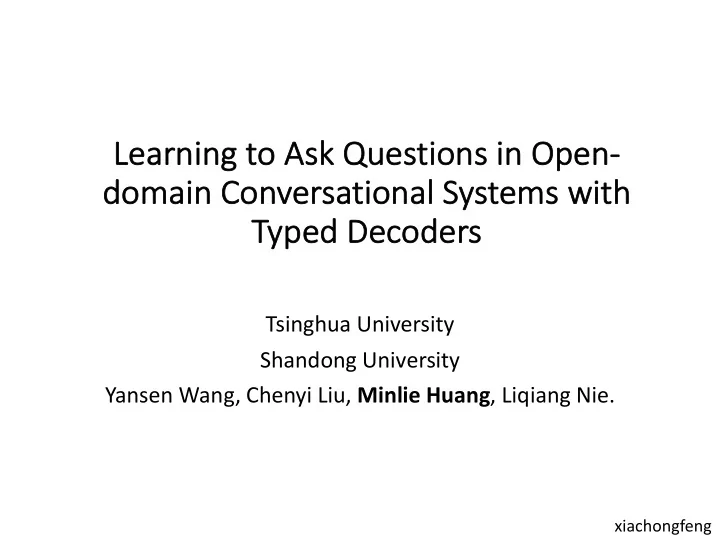

Learning to Ask k Questions in Open- do domain main Conversatio tional nal Systems ms with ith Typ yped Decoders Tsinghua University Shandong University Yansen Wang, Chenyi Liu, Minlie Huang , Liqiang Nie. xiachongfeng
As Aski king g Qu Ques esti tions in Ch Chatb tbots ts
Difference ces to traditional QG
Mo Moti tivati tion 1. Manually collected about 20 interrogatives 2. The verbs and nouns in a question are treated as topic words 3. All the other words as ordinary words
En Encoder-Dec Decoder er
Soft Typed So ed Dec ecoder er (STD) Assumes • each word has a latent type among the set {interrogative, topic word, • ordinary word}. Soft Typed Decoder (STD) • estimates a word type distribution over latent types in the given • context then computes type-specific generation distributions over the entire • vocabulary for different word types Why soft: word type is latent because we do not need to specify the type of • a word explicitly. each word can belong to any of the three types. tyt denotes the word type at time step t • ci is a word type •
Ha Hard Typ yped ed Dec Decoder er (HT HTD) • Difference • STD: the type of a word is implicit • HTD: the type of a word is explicit . Generates a word with the highest type probability • Dataset • words in the entire vocabulary are dynamically classified into three types • Process • Problem • may lead to severe grammatical errors if the first selection is wrong. • argmax is discrete and nondifferentiable
Ha Hard Typ yped ed Dec Decoder er (HT HTD) 如果使用 argmax ,会变成 1 , 0 , 0
Ca Case st study
TO TODO 1. PC-Lab 1. Dataset labeling 2. Paper reading : • Behaving more interactively: 1. Perceiving and Expressing Emotions (AAAI 2018) 2. Proactive Behavior by Asking Good Questions (ACL 2018) 3. Controlling sentence function (ACL 2018) 4. Topic change (SIGIR 2018) • 3.Reinforcement Learning Group • Lecture 1: Introduction to Reinforcement Learning
Thanks!
Recommend
More recommend